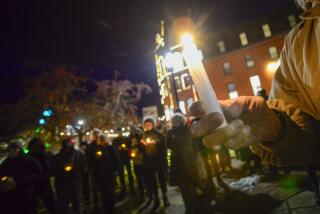White House to Host Meeting on Tougher U.S. Hate Crime Law
WASHINGTON — Supporters of legislation to expand federal hate crime law will meet at the White House next week, a little more than a week after a shooting outburst targeted at minorities. A similar bill died last year.
Bills introduced in the House and Senate would give the federal government a stronger hand in investigating and prosecuting acts of hatred motivated by sexual orientation, gender and disability.
“The federal government can’t continue to sit on the sidelines,” said Sen. Edward M. Kennedy (D-Mass.), who is sponsoring a bill with Sen. Arlen Specter (R-Pa.). “With each new tragedy, it becomes more and more difficult for Congress to claim there’s no problem.”
Representatives of dozens of civil rights groups are scheduled to meet with senior White House aides Monday to discuss lobbying for that bill and a similar one introduced in the House, said Richard Socarides, President Clinton’s civil rights advisor.
Supporters believe there’s less opposition to the bill than there was a year ago. Senate backers hope to attach the bill as an amendment to other legislation with a good chance of passage, he said.
Two people were killed and nine others wounded in Illinois and Indiana during the Fourth of July weekend, apparently by a white supremacist who committed suicide Sunday after a police chase.
Socarides said planning for Monday’s meeting began before the shootings, and the push for the law was inspired by a string of incidents, including the dragging death of a black man in Texas and the fatal beating of Matthew Shepard, a homosexual Wyoming college student who was lashed to a fence in October.
The House and Senate bills would add acts of hatred motivated by sexual orientation, gender and disability to the list of hate crimes already covered by federal law, such as those acts sparked by prejudice based on race, religion or national origin.
The change would allow states and local governments to ask the federal government to help in investigating and prosecuting those crimes. Federal officials also would be able to intervene if they believe that a state or local government is not pursuing a hate crime.
Opponents say the bill is unnecessary because states have not avoided prosecuting such crimes.
More to Read
Sign up for Essential California
The most important California stories and recommendations in your inbox every morning.
You may occasionally receive promotional content from the Los Angeles Times.










